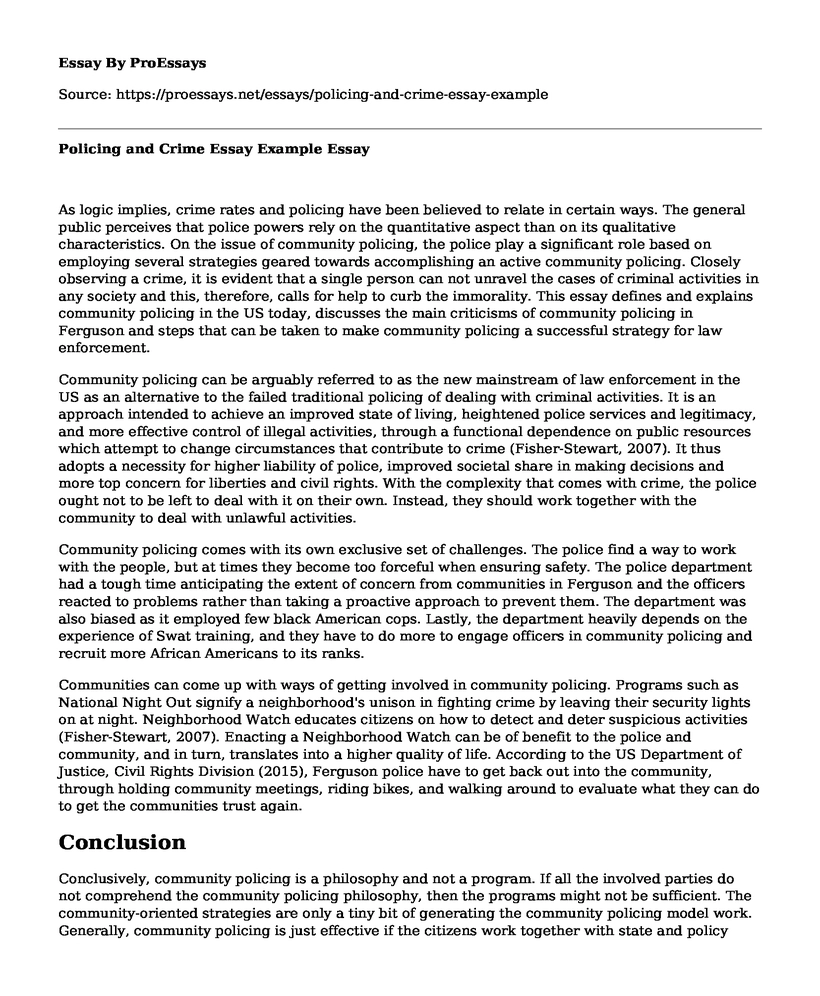As logic implies, crime rates and policing have been believed to relate in certain ways. The general public perceives that police powers rely on the quantitative aspect than on its qualitative characteristics. On the issue of community policing, the police play a significant role based on employing several strategies geared towards accomplishing an active community policing. Closely observing a crime, it is evident that a single person can not unravel the cases of criminal activities in any society and this, therefore, calls for help to curb the immorality. This essay defines and explains community policing in the US today, discusses the main criticisms of community policing in Ferguson and steps that can be taken to make community policing a successful strategy for law enforcement.
Community policing can be arguably referred to as the new mainstream of law enforcement in the US as an alternative to the failed traditional policing of dealing with criminal activities. It is an approach intended to achieve an improved state of living, heightened police services and legitimacy, and more effective control of illegal activities, through a functional dependence on public resources which attempt to change circumstances that contribute to crime (Fisher-Stewart, 2007). It thus adopts a necessity for higher liability of police, improved societal share in making decisions and more top concern for liberties and civil rights. With the complexity that comes with crime, the police ought not to be left to deal with it on their own. Instead, they should work together with the community to deal with unlawful activities.
Community policing comes with its own exclusive set of challenges. The police find a way to work with the people, but at times they become too forceful when ensuring safety. The police department had a tough time anticipating the extent of concern from communities in Ferguson and the officers reacted to problems rather than taking a proactive approach to prevent them. The department was also biased as it employed few black American cops. Lastly, the department heavily depends on the experience of Swat training, and they have to do more to engage officers in community policing and recruit more African Americans to its ranks.
Communities can come up with ways of getting involved in community policing. Programs such as National Night Out signify a neighborhood's unison in fighting crime by leaving their security lights on at night. Neighborhood Watch educates citizens on how to detect and deter suspicious activities (Fisher-Stewart, 2007). Enacting a Neighborhood Watch can be of benefit to the police and community, and in turn, translates into a higher quality of life. According to the US Department of Justice, Civil Rights Division (2015), Ferguson police have to get back out into the community, through holding community meetings, riding bikes, and walking around to evaluate what they can do to get the communities trust again.
Conclusion
Conclusively, community policing is a philosophy and not a program. If all the involved parties do not comprehend the community policing philosophy, then the programs might not be sufficient. The community-oriented strategies are only a tiny bit of generating the community policing model work. Generally, community policing is just effective if the citizens work together with state and policy offices to safeguard its success. Community policing opens a way for law enforcement to aid in re-energizing our society and neighborhood watch provides a strategy for citizens to help the police take back their community from crime.
References
Fisher-Stewart, G. (2007). Community policing explained: A guide for local governments. Washington, DC: US Department of Justice, Office of Community Oriented Policing Services.
US Department of Justice, Civil Rights Division. (2015). Investigation of the Ferguson police department. US Department of Justice.
Cite this page
Policing and Crime Essay Example. (2022, Aug 10). Retrieved from https://proessays.net/essays/policing-and-crime-essay-example
If you are the original author of this essay and no longer wish to have it published on the ProEssays website, please click below to request its removal:
- Washington Consensus vs. Santiago Consensus - Research Paper
- Article Analysis Essay on Trump on Closing the Border
- No Crime: Ross Drives to Save Lives - Essay Sample
- Essay Sample on The ACA: Transforming US Healthcare System Since 2010
- Essay Example on Youth Arrests in America: 95% Non-Violent, But Records Remain
- Essay Example on Criminal Law: Punishing Offenders & Resolving Disputes
- Reducing Recidivism: Examining Transitional Procedures and Programs for Successful Prison Re-Entry







